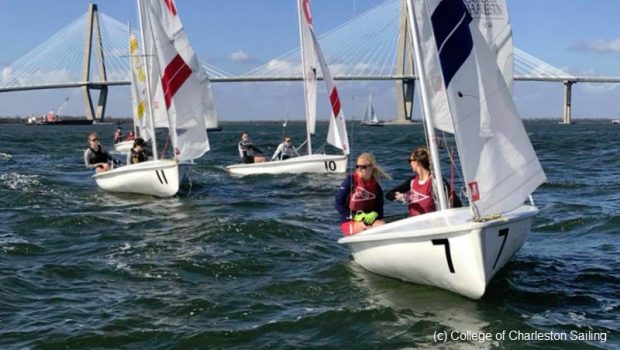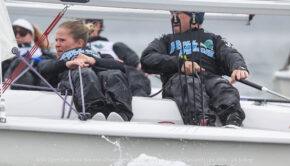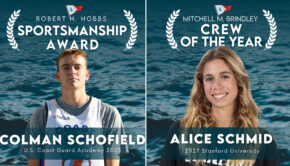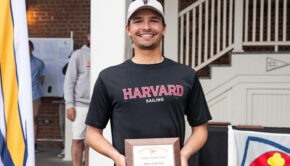College Sailing: Spring Season Update
Published on March 2nd, 2018
Chris Klevan provides this week’s update on activity in the Inter-Collegiate Sailing Association (ICSA).
The Intercollegiate Sailing Season does not have a “season opener,” and though, technically, this is the 4th week in which scores have been posted to Techscore, the ICSA’s scoreboard, the majority of the teams will ease their way into the spring season trying different combinations and experimenting with their team race lineup while maintaining continuity on the fleet race front, especially in the women’s game.
This past weekend, however, was a bigger one due to the arrival of some Mid-Atlantic and New England schools to the South Atlantic and Pacific Coast scene. As expected, the fair weather schools showed the northerners the importance of an early start. At the Mendelblatt Team Race at South Florida, the top-3 spots were filled by Stanford, USF and Charleston respectively. At the Phebe Corckran King Women’s regatta, Charleston and Stanford women’s teams claimed the top 2 spots.
The Mendelblatt Team Race was held at the University of South Florida and featured nine teams looking to get their seasons off to the right foot. #11 Stanford University dominated the event, finishing with a 19-1 record after two days of racing. Stanford’s team at this event was uncharacteristically young, sporting two freshmen skippers led by veteran, Will La Dow. Considering the fact that #1 Charleston sailed a very strong team, albeit not their best, Stanford’s record was particularly impressive.
“The Mendelblatt was the strongest I’ve ever seen the event this year with 9 good teams each getting about 20 races,” said Stanford assistant coach Clinton Hayes. “The weather was perfect, 80 degrees and mostly 5-10 knots. It was great to see some teams giving their women’s drivers opportunities to drive a real team race and hope to see more of that in the future.”
After a first round where the Cardinal went undefeated, Stanford went 3-1 in the top-5 round with their one loss coming to Charleston.
“Our team was a mix of new freshmen drivers and more experienced drivers and crews,” continued Hayes. “We have many strong crews on our team throughout each class year that will make big contributions in team racing. Will LaDow is our senior anchor on the team with a number of other drivers who will see action in the next month. We don’t have a clear top 3 but have some younger players who saw action at last year’s nationals as well as some talented freshmen who have a real shot at a starting role come May.”
#1 Charleston finished 3rd at the event with a 14-5 record. While this is a solid finish, it a slightly surprising one for a team deemed as the favorite to win it all this year. Like most teams sailing this event, Charleston was, undoubtedly, trying new things and, notably, the College Sailor of the Year front runner, Stefano Peschiera, was missing from the equation.
Nonetheless, two of the Cougar’s projected starters, Augie Dale and Christophe Killian, were sailing alongside a senior in Dirk Johnson with three excellent, starting crews: Elizabeth Pemberton, Katherine Lounsbury and Grace McCarthy. So, despite Peschiera’s absence, the 14-5 finish was enough to raise eyebrows.
Finishing second at the event was the University of South Florida Bulls with a 15-4 record. A complete team effort, the Bulls sailing seven different skippers and six different crews. Not many people saw the Bulls as a challenger for the South Atlantic conference crown, held by College of Charleston seemingly forever now, but perhaps defeating a Cougar team, sailing close to full strength, will be the start of a changing narrative.
At the very least, USF seems primed to finish second in a strong South Atlantic field, ensuring a trip to Team Race Nationals. The battle between the SAISA schools should be one to watch this upcoming season.
#4 Charleston won the Phebe Corckran King Women’s regatta in a tight battle over #10 Stanford and #17 Boston University. Stanford started the regatta hot in both divisions as it took until race 7A before the Cardinal scored any races outside the top 5. Not coincidentally, it was race 7A where Charleston made their move.
After a shaky start, the Cougar A-Division boat turned it on in race 5 when junior Caroline Bracken stepped into the boat. With Bracken, Alie Toppa ‘20 scored 4 bullets in the next 6 races and the Cougars charged past the Stanford Cardinal and the BU Terriers over that span. They never looked back.
Toppa and Bracken with Annabel Carrington ‘19 won A-Division by 2 points over Stanford’s Julia Lambert ‘18 and Victoria Thompson ‘21. Lydia Grasberger ‘18 and Meri Harrington ‘18 of Boston University finished 3rd.
Despite the mid-regatta heroics of Toppa, Bracken and Carrington, the Cougar victory was ensured by an impressive B-Division performance by Paris Henken ‘19 with Liza Toppa ‘20 and Elizabeth Mignon ‘19. Henken, Toppa and Mignon nearly won the division bell to bell and finished with a 6 point lead despite only 13 races sailed.
Charleston finished the event with 80 points, Stanford second with 88 and BU, 3rd with 91.
Background: The Inter-Collegiate Sailing Association (ICSA) is the governing authority for sailing competition at colleges and universities throughout the United States and in some parts of Canada. There are seven Conferences that schedule and administer regattas within their established geographic regions, with ICSA hosting two national championships in the fall (singlehanded, match racing) and three national championships in the spring (team, women’s, coed). collegesailing.org









 We’ll keep your information safe.
We’ll keep your information safe.